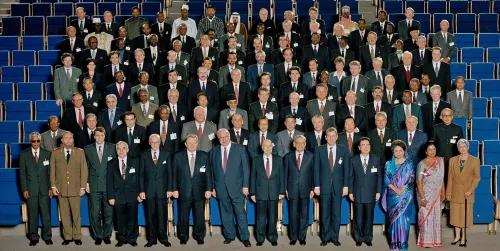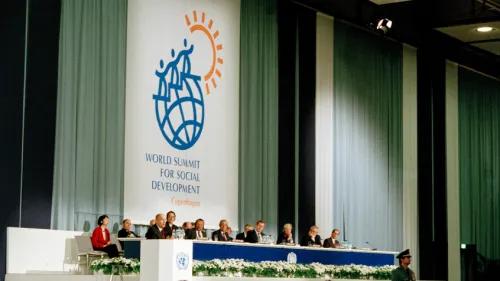History

The World Summit for Social Development was first held in Copenhagen in 1995, bringing together global leaders to establish the 10 Commitments - landmark framework aimed at tackling poverty, unemployment, and social exclusion.
The summit laid the foundation for a people-centered approach to development, emphasizing the importance of social policies in economic and political decision-making.
The summit was attended by more than 14,000 people, include delegates from 186 countries, with 117 represented at the level of Heads of State or Government. At the Summit, Governments pledged to make the conquest of poverty, the goal of full employment and the fostering of social integration overriding objectives of development.

At the conclusion of the Summit, Governments adopted a Declaration and Programme of Action which represented a new consensus on the need to put people at the centre of development - in order to advance social development through 10 commitments, including eradicating poverty, reducing inequality and promoting social integration.
In the Declaration, Member States agreed to promote international peace and security, accelerate development in Africa and the least developed countries, and mobilize resources for achieving social progress. They presented economic development, social progress and environmental protection as interdependent and components of sustainable development.

The 10 Commitments of Copenhagen:
- Creating an Enabling Environment for Social Development
Governments pledged to promote peace, democracy, and human rights as the foundation for sustainable social and economic progress.
- Eradicating Poverty
Recognizing poverty as a major global issue, world leaders committed to reducing and eventually eliminating poverty by ensuring access to resources, opportunities, and social protection.
- Promoting Full Employment
The declaration emphasized the right to productive and freely chosen employment, ensuring fair wages, decent working conditions, and equal opportunities for all.
- Fostering Social Integration
Leaders committed to building inclusive societies where diversity is valued, and discrimination, exclusion, and marginalization are actively combated.
- Achieving Gender Equality
The summit underscored the importance of gender equality, pledging to eliminate discrimination against women and ensure equal rights in economic, political, and social spheres.
- Access to Education and Health Care
Recognizing education and healthcare as fundamental human rights, governments committed to expanding access to quality education, primary healthcare, and essential services.
- Accelerating Development in Africa and Least Developed Countries
Special attention was given to addressing the unique challenges faced by African nations and least developed countries, emphasizing international cooperation and support.
- Ensuring Universal Social Protection
Governments pledged to develop social protection systems, including social safety nets, to safeguard the most vulnerable populations from economic and social shocks.
- Mobilizing Resources for Social Development
The commitments emphasized the need for adequate financial resources, both domestic and international, to support social development goals effectively.
- Strengthening International Cooperation
Recognizing that social development is a shared global responsibility, leaders committed to fostering international partnerships to address social challenges collaboratively.
The Copenhagen Commitments laid the groundwork for inclusive social development, influencing global agendas such as the Sustainable Development Goals (SDGs). As the world prepares for the Second World Social Summit, these commitments continue to serve as guiding principles for promoting dignity, equality, and well-being for all.
 Welcome to the United Nations
Welcome to the United Nations